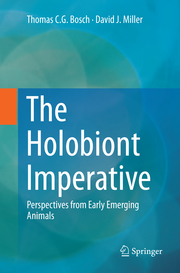Detailansicht
The Holobiont Imperative
Perspectives from Early Emerging Animals
ISBN/EAN: 9783709148846
Umbreit-Nr.: 5461714
Sprache:
Englisch
Umfang: x, 155 S., 51 s/w Illustr., 6 farbige Illustr., 15
Format in cm:
Einband:
kartoniertes Buch
Erschienen am 25.04.2018
Auflage: 1/2016
- Zusatztext
- This book examines how the growing knowledge of the huge range of animal-bacterial interactions, whether in shared ecosystems or intimate symbioses, is fundamentally altering our understanding of animal biology. Individuals from simple invertebrates to human are not solitary, homogenous entities but consist of complex communities of many species that likely evolved during a billion years of coexistence. Defining the individual microbe-host conversations in these consortia, is a challenging but necessary step on the path to understanding the function of the associations as a whole. The hologenome theory of evolution considers the holobiont with its hologenome as a unit of selection in evolution. This new view may have profound impact on understanding a strictly microbe/symbiont-dependent life style and its evolutionary consequences. It may also affect the way how we approach complex environmental diseases from corals (coral bleaching) to human (inflammatory bowel disease etc). The book is written for scientists as well as medically interested persons in the field of immunobiology, microbiology, evolutionary biology, evolutionary medicine and corals.
- Kurztext
- This book examines how the growing knowledge of the huge range of animal-bacterial interactions, whether in shared ecosystems or intimate symbioses, is fundamentally altering our understanding of animal biology. Individuals from simple invertebrates to human are not solitary, homogenous entities but consist of complex communities of many species that likely evolved during a billion years of coexistence. Defining the individual microbe-host conversations in these consortia, is a challenging but necessary step on the path to understanding the function of the associations as a whole. The hologenome theory of evolution considers the holobiont with its hologenome as a unit of selection in evolution. This new view may have profound impact on understanding a strictly microbe/symbiont-dependent life style and its evolutionary consequences. It may also affect the way how we approach complex environmental diseases from corals (coral bleaching) to human (inflammatory bowel disease etc). The book is written for scientists as well as medically interested persons in the field of immunobiology, microbiology, evolutionary biology, evolutionary medicine and corals.
- Autorenportrait
- Thomas Bosch is Professor of General Zoology at Kiel University since 2000. His awards include the Dr. Honoris Cause Degree from St. Petersburg State University, Russia. The Bosch lab studies within others the evolution of immunity, by analyzing the molecular interactions between microbes and host (Hydra) cells that promote normal development and homeostasis. David Miller is an outstanding world-renowned scientist at the ARC Centre of Excellence for Coral Reef Studies and School of Pharmacy and Molecular Sciences, James Cook University, Australia, where he is heading the program on genomics and metagenomics of coral reefs. The long-term aim of this Program is to understand how the "holobiome" functions under normal and stressed states.
